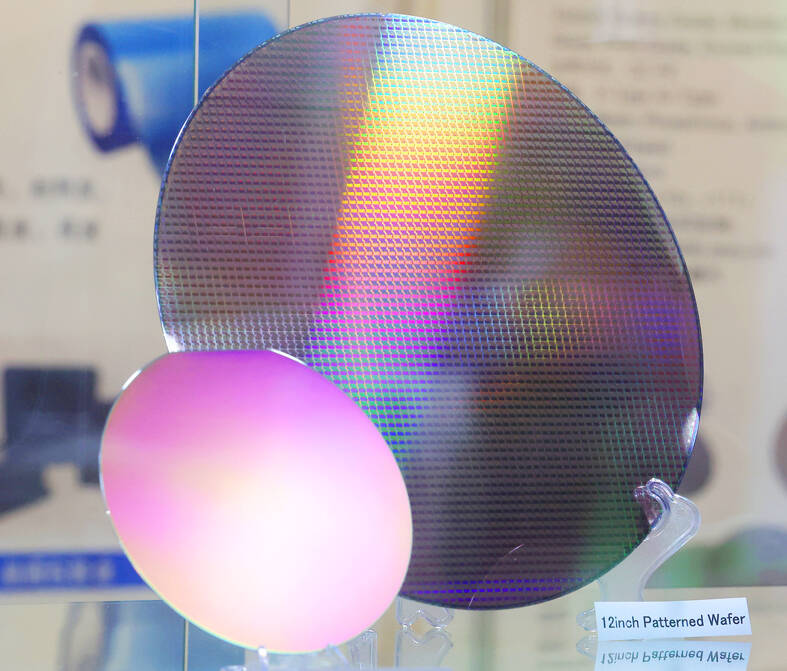A record number of exhibitors will this year attend Semicon Taiwan, an annual international trade fair in the semiconductor technology sector, when it opens on Wednesday next week in Taipei, organizer SEMI Taiwan said yesterday.
The annual event will feature more than 3,600 booths from over 1,100 exhibitors from home and abroad, the highest number since it was first held in 1996, according to SEMI Taiwan, an organization located in Hsinchu County that connects about 3,000 member companies and 1.5 million professionals worldwide to advance the technology and business of electronics design and manufacturing.
Ray Yang (楊瑞臨), an international strategy development consulting director at the government-sponsored Industrial Technology Research Institute (ITRI) and a committee member at SEMI Taiwan, said this year’s event has a theme of "Empowering AI Without Limits," and highlights the significance of silicon photonics and fan-out panel level packaging (FOPLP).

Photo: CNA
A forum focusing on silicon photonics will be held during the event, featuring experts from organizations and companies, including Taiwan Semiconductor Manufacturing Co (TSMC, 台積電), Inter-university Microelectronic Centre, and Marvell Technology Group Ltd, for discussions regarding the opportunities and challenges facing silicon photonics, Yang added.
Silicon photonics — known for its high bandwidth, low power consumption, long-distance transmission and cost-saving features — has become a hot topic in the semiconductor industry. It is estimated that the global silicon photonics market could reach US$7.86 billion by 2030.
In addition, a forum on FOPLP will also be held, with experts including those from Applied Materials Inc, Manz AG and Advanced Semiconductor Engineering Inc discussing and exploring related technological developments.
Driven by demand for 5G, artificial intelligence of things, automotive, high-performance computing and consumer products, FOPLP shows significant growth potential. According to research firm Yole Group, the market is expected to reach US$221 million by 2028, with a compound annual growth rate of 32.5 percent from last year to 2028.
Meanwhile, several TSMC senior managers, including executive vice president and co-chief operating officer YJ Mii (米玉傑), vice president of Pathfinding and Corporate Research Min Cao (曹敏), vice president of Advanced Packaging Technology and Service Jun He (何軍) and director of Advanced Packaging Business Development Jerry Tsou (鄒覺倫), will deliver speech at different forums during the event, Yang said.
He added that there will be 13 country sections at this year’s exhibition, with France, Malaysia and the Philippines new additions to the list.
Semicon Taiwan will take place from Wednesday to Friday at the Taipei Nangang Exhibition Center.

On Tuesday, US President Donald Trump weighed in on a pressing national issue: The rebranding of a restaurant chain. Last week, Cracker Barrel, a Tennessee company whose nationwide locations lean heavily on a cozy, old-timey aesthetic — “rocking chairs on the porch, a warm fire in the hearth, peg games on the table” — announced it was updating its logo. Uncle Herschel, the man who once appeared next to the letters with a barrel, was gone. It sparked ire on the right, with Donald Trump Jr leading a charge against the rebranding: “WTF is wrong with Cracker Barrel?!” Later, Trump Sr weighed

HEADWINDS: Upfront investment is unavoidable in the merger, but cost savings would materialize over time, TS Financial Holding Co president Welch Lin said TS Financial Holding Co (台新新光金控) said it would take about two years before the benefits of its merger with Shin Kong Financial Holding Co (新光金控) become evident, as the group prioritizes the consolidation of its major subsidiaries. “The group’s priority is to complete the consolidation of different subsidiaries,” Welch Lin (林維俊), president of the nation’s fourth-largest financial conglomerate by assets, told reporters during its first earnings briefing since the merger took effect on July 24. The asset management units are scheduled to merge in November, followed by life insurance in January next year and securities operations in April, Lin said. Banking integration,

LOOPHOLES: The move is to end a break that was aiding foreign producers without any similar benefit for US manufacturers, the US Department of Commerce said US President Donald Trump’s administration would make it harder for Samsung Electronics Co and SK Hynix Inc to ship critical equipment to their chipmaking operations in China, dealing a potential blow to the companies’ production in the world’s largest semiconductor market. The US Department of Commerce in a notice published on Friday said that it was revoking waivers for Samsung and SK Hynix to use US technologies in their Chinese operations. The companies had been operating in China under regulations that allow them to import chipmaking equipment without applying for a new license each time. The move would revise what is known

Artificial intelligence (AI) chip designer Cambricon Technologies Corp (寒武紀科技) plunged almost 9 percent after warning investors about a doubling in its share price over just a month, a record gain that helped fuel a US$1 trillion Chinese market rally. Cambricon triggered the selloff with a Thursday filing in which it dispelled talk about nonexistent products in the pipeline, reminded investors it labors under US sanctions, and stressed the difficulties of ascending the technology ladder. The Shanghai-listed company’s stock dived by the most since April in early yesterday trading, while the market stood largely unchanged. The litany of warnings underscores growing scrutiny of